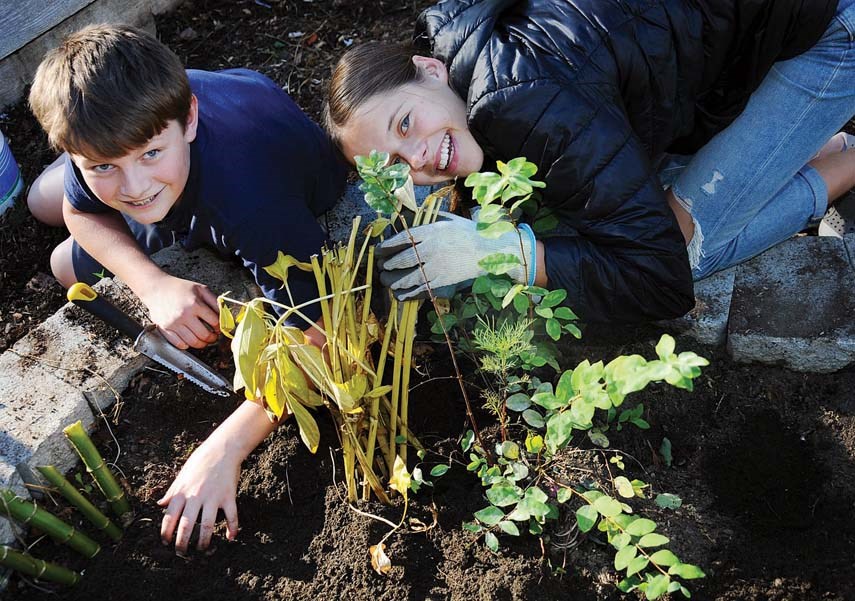It was a little more than seven years ago that Rockridge Secondary teacher/librarian Arlene Anderson was honoured with the Prime Minister’s Awards for Teaching Excellence.
At a ceremony in Ottawa, Anderson was feted by then-Prime Minister Stephen Harper, largely in recognition for her role laying both the groundwork and the topsoil for Rockridge’s environmental club.
By introducing a composting program the club cut school waste by nearly 50 per cent. But perhaps just as significantly, the club was responsible for bringing a sense of stewardship for the great outdoors inside.
“One of our biggest breakthroughs is that teachers are now incorporating some of the things that began with our environment club into their curriculum,” Anderson said in 2011. “It’s becoming a culture in
our school.”
That culture has continued, with 25 students planting, weeding, digging and getting their hands dirty once a week under the watchful eye of Rockridge science teacher Jennifer Towers, who took over following Anderson’s retirement.
“I thought: I love the environment,” she says of her decision to get involved with the club.
But while Anderson has stepped back, she’s still happy to toil and till, assisting as a volunteer Garden Angel.
“She’s been helping us a lot to get the garden going,” Towers says, noting Anderson’s role with the Edible Garden Project. “What she learns there she’s been sharing with us, so that’s really helped us figure out what you can grow in a garden like that.”
There’s an added challenge in seeing what will take root in the Rockridge dirt, Towers says, noting the vegetables largely need to be harvested while school is still in session.
“We were growing basil and it grew beautifully,” Towers recalls. “We were getting tons of it in the summer . . . and then it felt like we threw away a lot of nice basil because we didn’t have enough places for it to go.”
In a bid to avoid summer harvests wasting their sweetness in the summer air, the club has focused on garlic, kale, beets, lettuce, radishes, and peas, all of which are sold to teachers and parents.
“We have to try to get it to come up at the right time,” Towers says.
This autumn’s harvest is set to include pumpkins, which are set to be roasted and turned into pumpkin pie.
While the club initially strove to introduce ecological awareness into the classroom, the current emphasis is on encouraging students to enjoy the garden as a place of beauty and serenity.
“When I first started with the environment club the garden was an ugly place,” Towers says, referring to the gravel and chain link fence.
With mulch on the ground and tulips mingling with other perennials in the garden, it’s a little nicer to look at. Towers is hoping to add a few benches as well.
“That’s where we might look for funding later this year,” she says.
The club previously won a $20,000 Solar BC grant, which was used to buy 15 solar panels for the school roof.
The club appeals to a range of tastes and sensibilities, according to Towers.
“I think it’s an opportunity for (students), if they don’t have a garden in their home, to just be in a garden. They get a chance to see how food actually grows. They like the idea of it being organic and being able to provide local produce for people,” she says.
But the club has also served as a hub for “kind, thoughtful kids” searching for a social outlet, she adds. Some kids join the club, become part of the executive, and: “that becomes their thing that kind of guides them through high school,” Towers says.
Farm to School BC announced a plan to award up to $3,500 to educators looking to start their own school garden project. The deadline to apply is Nov. 19.
Farm to School BC is also offering five $100 stipends for the best garden photo and caption.
For more information or to apply visit farmtoschoolbc.ca/farm-to-school-bc-grant-application-form-2018/.



